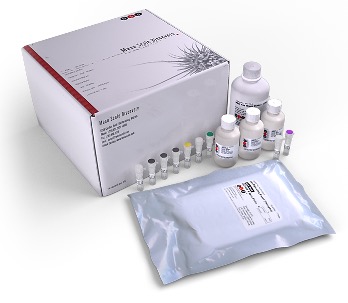Lab Profiles Differentiate MIS-C From Severe Pediatric COVID-19
By LabMedica International staff writers
Posted on 19 Aug 2020
Initial reports from the Severe Acute Respiratory Coronavirus 2 (SARS-CoV-2) pandemic described children as being less susceptible to Coronavirus Disease 2019 (COVID-19) than adults. Subsequently, a severe and novel pediatric disorder termed Multisystem Inflammatory Syndrome in Children (MIS-C) emerged. Posted on 19 Aug 2020
MIS-C is defined by clinically severe illness requiring hospitalization with fever, inflammatory marker elevation and multisystem organ dysfunction in the setting of recent proven or probable SARS-CoV-2 infection, and in the absence of an alternative likely explanation. Kawasaki disease (KD) is a medium vessel vasculitis that occurs almost exclusively in infants and children.

The V-Plex Pro-inflammatory Panel 1 Human Kit (Photo courtesy of Meso Scale Diagnostics).
Pediatricians at the Children's Hospital of Philadelphia (Philadelphia, PA, USA) and colleagues prospectively screened and enrolled 20 hospitalized patients with evidence of SARS-CoV-2 infection. Patients were categorized as having MIS-C if they had fever, clinically severe illness with multisystem organ involvement (>2 of cardiac, renal, respiratory, hematologic, gastrointestinal, dermatologic or neurological), no alternative plausible diagnosis and positive SARS-CoV-2 infection by RT-PCR, serology, or COVID-19 exposure within the four weeks prior to the onset of symptoms.
Quantification of 10 pro-inflammatory cytokines was performed using V-Plex Pro-inflammatory Panel 1 Human Kits (Meso Scale Diagnostics, Rockville MD, USA). Cytokines assayed were IFN-γ, IL-1β, IL-2, IL-4, IL-6, IL-8, IL-10, IL-12p70, IL-13, and TNF-α. Samples were analyzed in duplicates and assays were performed per manufacturer protocol and read and analyzed on a Meso Scale Diagnostics QuickPlex SQ120. Triplicates of plasma samples were assayed for soluble C5b-9 (sC5b-9) levels at two dilutions by using human C5b-9 ELISA set (BD Biosciences, San Jose CA, USA). Viral cycle thresholds (Cts) for SARS-CoV-2 were also measured.
The scientists found that the sum of IL-10 and TNF-α levels uniquely identified MIS-C from severe COVID-19 presentations (mean [95% CI]; Severe: 30.06 [9.54-50.6] versus MIS-C: 82.25 [32.5-132.0]). They noted that this profile for MIS-C, particularly marked elevations in IL-10, is distinct from previously reported cytokine profiles in KD, which tend to be associated with mild elevations of IL-1, IL-2, and IL-6. They also noted that Cts and burr cells on blood smears also differentiated between patients with severe COVID-19 and those with MIS-C. Patients with severe COVID-19 had low cycle thresholds, but those with MIS-C had high cycle thresholds (mean [95% CI]; Severe: 28.0 [26.8–29.1] versus MIS-C: 37.9 [34.8–41.0].
Aside from patient cytokine profiles, which require sophisticated laboratory equipment, the authors also found that simple peripheral blood smears could help distinguish the three conditions. Burr cells were absent in patients with mild COVID-19, but present in 40% of patients with severe disease. However, the authors noted that all patients with MIS-C had at least some burr cells present, with 60% of patients having 4+ burr cells. The study was published on July 30, 2020 in The Journal of Clinical Investigation.
Related Links:
Children's Hospital of Philadelphia
Meso Scale Diagnostics
BD Biosciences









 (3) (1).png)




